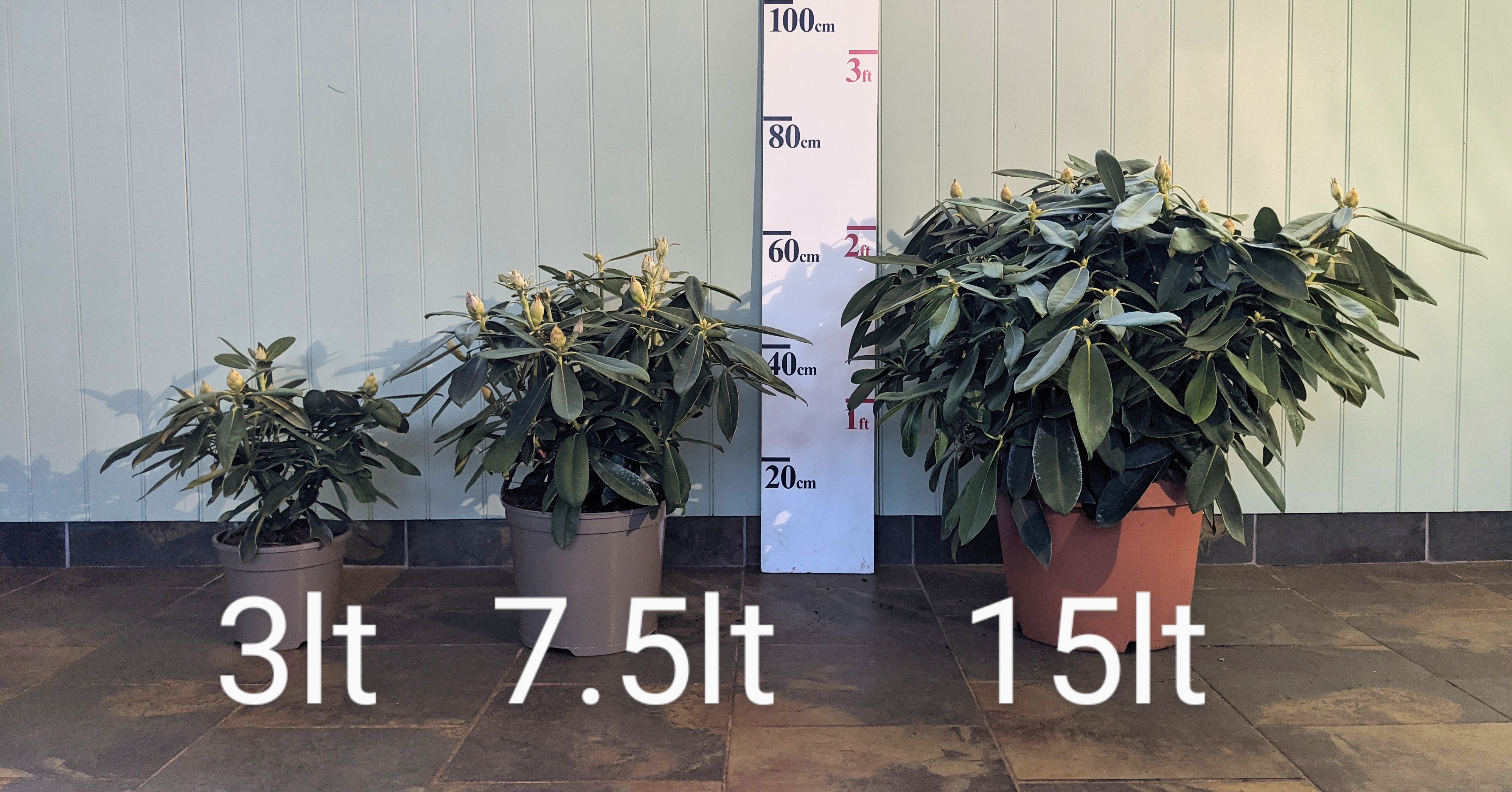Rhododendron Rubicon
Item: HRUBI
 Currently Unavailable
Currently Unavailable
April
Red
100-125cm
Not Scented
No
To -15 °C
Collect in Store
This item is available for collection.
Home Delivery
UK mainland delivery from £14.95
(H4) One of the best reds available for mild gardens. Bright cardinal red flowers with black spots in the throat. April flowering. The flowers are set off by the shiny dark green, medium sized bullate leaves. The plant is compact growing and will require shelter from hard frosts, but prefers a fairly sunny location. Height 100-125cm in 10 years.
• Ideal for mild or sheltered gardens.
• Requires protection from hard frosts.
• Parentage: ‘Noyo Chief’ X Kilimanjaro Group.
• Hybridization date: pre 2000 (1979).
• Bred by: R.C.Gordon Origin: New Zeland.
• Habit: Compact.
• Ideal position: Light dappled shade.
• Ideal soil: pH 4.5 to 6.
• RHS Hardiness Rating: H4.
• How we usually propagate this plant: Graft.
Good to know
Dome-shaped plants ideal for pots and small borders, growing to 75-100cm (2.5-3 foot) in 10 years. These are mainly of Rhododendron williamsianum and Rhododendron yakushimanum hybrids.
R. williamsianum hybrids normally flower in April and are tolerant of slightly higher pH, which can be useful for those growing on neutral soils. They have small clusters of bell-shaped flowers which hang down, which contrast well with other rhododendrons. Their rounded leaves makes them a great foliage plant all year, and softens the landscape in larger planting schemes. Some varieties can be shy to flower as a young plant, but will normally flower in the year after planting out.
'Yak' hybrids mainly flower in May, with a small rounded truss of flowers, often bright in colour when first opening, but always fading paler over the next couple of weeks. These are typically very tough plants, which are ideal for the front of border, or for more formal situations Alternatively, yak hybrids are suitable for growing in pots and containers; re-pot every 3 years for best performance. Most varieties will bud up and flower as a 3 litre plant.
They will take sun or shade, but dappled is best. Compact rhododendrons like moist acidic soil, with good drainage, and plenty of organic matter such as leaf-mould and added ericaceous compost. Plant no deeper than the top of the rootball, and dig in plenty of good ericaceous compost around the sides. For a guide to plant spacing, use the height we give in 10 years as a guide to the distance between each plant, so this is about 1 plant per m². Give a teaspoon of slow-release feed at the 3 litre size, rising to a small handful full for mature plants. They are not normally nibbled by deer and rabbits. Pruning is not recommended, but wayward shoots can be cut back straight after flowering to improve shape.
Please note: Most of these varieties are dome shaped plants, often wider than their height. Specimen size plants (eg 80-90cm) will be measured by their largest measurement which is typically the spread of the plant.
For further advice, For further advice, see here
Size Guide

picture for example only
The Basics
Ideal soil
Acidic soil, good organic content, pH 4.5-6.0. Inkarho range of rhododendrons will tolerate soils up to pH7.5
Sun or Shade
Light dappled shade is best for most varieties.
Shelter
Refer to hardiness rating. Give young plants protection.
Site Selection
Avoid close to trees, roots, invasive weeds, walls, hot patios, dry banks and waterlogged soils. Do not use weed matting or stone mulch.
Plant spacing
Use the height shown in 10 years as a guide to the distance between each plant. Allow room for plant to fill out. If planting closer for instant impact, be prepared to move plants after a few years.
Compost
- 3 litre pot, dig in 10-20 litres of ericaceous compost.
- 7.5 litre pot, dig in 20-30 litres of ericaceous compost.
- 70-80cm specimen, dig in 60 litres of ericaceous compost.
- 100-120cm specimen, dig in 120 litres of ericaceous compost.
Planting depth
Plant high in the ground, with the top of the rootball visible.
Feeding
Slow-release ericaceous feed recommended in March and straight after flowering.
Mulch
Recommended every few years.
Water
The key ingredient! Keep moist all season, especially the critical time at end of June for flower bud initiation. Tap water is better than no water. Heavy dose at least once per week in dry weather.
Drainage
Ensure good drainage in winter, especially with yellow flowering varieties. Avoid waterlogged sites.
Pruning
Rhododendrons and Camellias: Not normally required. Tidy wayward shoots after flowering.
Evergreen azaleas and Bloombux can be clipped into a low hedge.
Magnolias and Acers: Formative pruning when young to shape into a tree or bush.
Deadheading
Remove old flower-heads, particularly on young or weak plants.
For further advice see here
Delivery & Returns
Our website calculates the delivery charge according to weight and delivery location throughout the UK. To see these charges, please enter your postcode at the checkout, and you will see the charge vary as you add more items to your wheelbarrow.
 Millais Nurseries
Millais Nurseries



